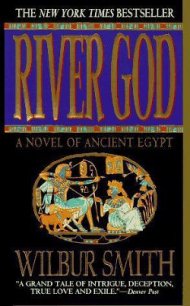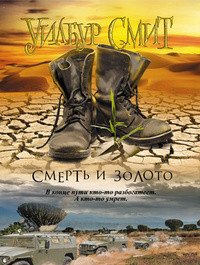Men of Men - Smith Wilbur (книги бесплатно без txt) 📗
"They are coming again," Zouga said quietly, almost to himself. "This is the fifth time."
"It's madness." Mungo Sint John murmured, as the racing ranks came out of the trees and over the lip of the river bank, their plumes seething like the surface of boiling milk as they came onto the guns.
The field guns were depressed to the limit of their travel, the fuses screwed down to their shortest range, and the shrapnel bursts were strangely beautiful in the morning sky, popping open like pods of new cotton, shot through with pretty red fire.
The storm of small-arms fire was like the monsoon rains beating on an iron roof, and as the impis came into the drifting banks of gunsmoke, the dense ranks thinned out, and lost momentum, like a wave sliding up a steep beach.
Once again the wave faltered, and just short of the wagons it stopped, hesitated and then was going back, and the storm of gunfire continued long after the last of them had disappeared amongst the trees. In a kind of insensate fury the Maxim bullets tore wet white slabs of bark off the tree trunks, and then one after the other fell silent.
Standing beside Zouga, Doctor Jameson scrubbed his hands together gleefully. "It's all over. Their impis are destroyed, shattered, blown away. it's better than we could ever have hoped for. Tell me, Sint John, as a military man, what do you estimate their losses to be so far?"
Mungo Sint John considered the question seriously, climbing up onto one of the wagons the better to survey the field, ignoring the spattering of Martini-Henry rifle fire from the edge of the treeline where a few Matabele snipers were making very poor practice; convinced that raising their sights to the maximum made the bullets more powerful, most of their fire crackled high over the heads of the men manning the wagons.
Standing on the wagon Mungo Sint John lit a cheroot without transferring his attention from the carnage which surrounded them. At last he said gravely, "Not less than two thousand casualties, perhaps as many as three."
"Why don't you send a party out to count the bag, Doctor?" Zouga suggested, and Jameson did not recognize the sarcasm.
"We cannot spare the delay, more is the pity. We can still get in a full day's trek. That will look good in the Company report." He pulled the gold chain from his fob pocket and sprang the lid of his watch with his thumbnail. "Eight o'clock," he marvelled. "It's only eight o'clock in the morning. Do you realize that we have won a decisive battle before breakfast, gentlemen, and that by ten o'clock we can be on our way to Lobengula's royal kraal?
I think we have done our shareholders rather proud."
"I think," Zouga cut in gently. "That we still have a little more work to do. They are coming again."
"I don't believe this," Mungo Sint John marvelled.
Bazo paced slowly down the sparse ranks. This was no longer an impi. It was a pathetic little band of desperate survivors. Most of them had bound up their wounds with bloody bunches of green leaves, and their eyes had that strange fixed stare of men who had just looked into eternity. They were no longer singing, they squatted in silence, but they were still facing towards the white men's laager.
Bazo passed beyond the shortened line and paused under the spreading branches of a wild teak tree. He looked up.
Mationda, the commander of what had once been the glorious Insukamini impi, hung by his neck from one of the main branches. There was a thong of rawhide around his throat, and his eyes were still open, bulging in a defiant glare towards his enemies. His right leg, shattered above the knee by machine-gun fire, was twisted at an ugly angle and hung lower than his other leg.
Bazo lifted his assegai in a salute to the dead induna.
"I greet you, Manonda, who chose death rather than to drink the bitter draught of defeat," he shouted.
The Insukamini impi was no more. Its warriors lay in deep windrows in front of the wagons.
"I praise you, Manonda, who chose death rather than to live a cripple and a slave. Go in peace, Manonda and speak sweetly to the spirits on our behalf."
"""Now"
Bazo turned back and stood before the waiting, silent ranks. The early morning sun, just clearing the tree tops, threw long black shadows in front of them.
"Are the eyes still red, my children?" Bazo sang out in a high clear voice.
"They are still red, Baba!" they answered him in bass chorus.
"Then let us go to do the work which still waits to be done."
Where ten amadoda had raced in that first wave, now two made the last charge across the blood-soaked clay.
Only one of that pitiful band went more than halfway between the treelines and the wagons. The rest of them turned back and left Bazo to run on alone. He was sobbing with each stride, his mouth open, the sweat running in oily snakes down his naked chest. He did not feel the first bullet that struck him. It was just a sudden numbness as though part of his body was missing, and he ran on, jumping over a pile of twisted corpses, and now the sound of the guns seemed muted and far-off, and there was another greater dinning in his ears that boomed and echoed strangely like the thunder of a mighty waterfall.
He felt another sharp tug, like the curved red-tipped thorn of the "wait-a-bit" tree hooking into his flesh, but there was no pain. The roaring in his head was louder, and his vision narrowed so that he seemed to be looking down a long tunnel in the darkness.
Again he felt that irritating but painless jerk and tug in his flesh, and he was suddenly weary. He just wanted to lie down and rest, but he kept on towards the flashing white canvas of the wagon tents. Yet again that sharp insistent pull as though he was held on a leash, and his legs buckled under him. Quite gently he toppled forward and lay with his face against the hard sun-baked clay.
The sound of the guns had ceased, but in its place was another sound, it was the sound of cheering; behind the wall of wagons the white men were cheering themselves.
Bazo was tired, so utterly deathly tired. He closed his eyes and let the darkness come.
The wind had swung suddenly and unseasonably into the east, and there was a cold dank mist lying on the hills. the fine guti which made the trees drip dismally and chilled every bone in Tanase's body as she trudged up a narrow path that led to a saddle between two pearly grey granite peaks. Over her shoulders was a leather cloak and on her head she balanced a bundle of possessions which she had salvaged from the cave of the Umlimo.
She reached the saddle and looked down into yet another valley choked with dense, dark green undergrowth. She searched it eagerly, but then her spirits slowly fell again. Like all the others, it was devoid of any human presence.
Since she had left the secret valley, the moon had reached its full, and waned to nothingness, and was once again a curved yellow sliver in the night sky. All that time she had searched for the women and children of the Matabele nation. She knew they were here, hiding somewhere in the Matopos, for it was always the way.
When a powerful enemy threatened the nation, the women and children were sent into the hills, but it was such a vast area, so many valleys and deep labyrinthine caves that she might search a lifetime without finding them.
Tanase started slowly down into the deserted valley.
Her legs felt leaden, and another spasm of nausea brought saliva flooding from under her tongue. She swallowed it down, but when she reached the floor of the valley, she sank down onto a moss-covered rock beside the little stream.
She knew what was the cause of her malady; though she had missed her courses by only a few days, she knew that the loathsome seed that her pale, hairy, balloonbellied ravisher had pumped into her had struck and taken hold, and she knew what she must do.




